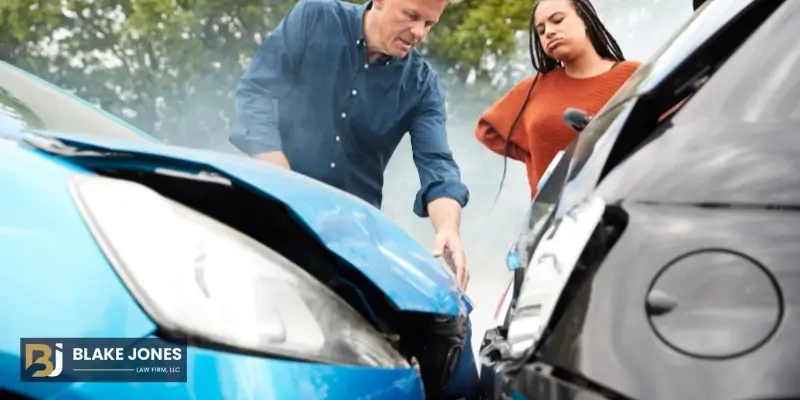What to Do When You Get Into a Lafayette Car Accident

Getting into even a minor car accident is scary. It can be hard to figure out what to do next. Knowing what to do when you get in a Lafayette car accident can keep the other driver from taking advantage of you.
Check for Injuries
Start by checking yourself. Take a breath and look for pain or bleeding. Then check your passengers. If anyone can’t move, don’t try to move them. Call 911 and explain what happened. Stay calm.
Paramedics and officers will arrive shortly after. Paramedics will treat those in need. Police will create a crash report. That report helps with insurance later. If no one is hurt, police may still respond to direct traffic and gather facts.

New Orleans Louisiana
We take care of Your family while you can’t work
Call for A Consultation 504-525-4361
Move to a Safe Location
If your car still runs, try to move off the road. Pull into a parking lot or shoulder if one is nearby. This helps prevent another crash and keeps traffic flowing.
If you can’t move the vehicle, turn on the hazard lights. Warn other drivers while you wait for help. Don’t stand near moving traffic. Stay inside the vehicle if the area feels unsafe.
Report the Accident to the Police
Louisiana law requires you to report crashes that cause injury, death, or over $500 in damage. If you’re not sure how much the damage costs, report it anyway. Police will come and create a report.
That report becomes a record of what happened. It may also say who officers believe was at fault. 29% of traffic fatalities in Louisiana in 2022 were alcohol-related. If a police officer believes alcohol was involved, they might include it in the report.
Exchange Information
Stay calm while gathering information. Ask the other driver for their name and insurance card. Write down their license plate number and take a photo if possible.
Ask for the contact info of witnesses if there are any nearby. Their version of events may support your case if the other driver denies fault.
Get Medical Attention
Even if you feel okay, some injuries take hours or days to show up. Soreness may seem small at first, but it can grow worse. Go to a healthcare provider soon after the crash.
Tell the provider that the injury came from a car accident. Ask for records of the visit. Those records may help link your pain to the crash if the insurer questions it.
Follow the doctor’s orders. Keep track of any other visits you have related to the injury. It might help to keep a record of how the injury affects your daily life. These notes can support your claim.
Notify Your Insurance
After the crash, contact your insurer quickly. Many policies require notice within a few days. Here’s how to do it the right way:
- Keep your report simple. Share where the crash happened, the time, and who was involved. Don’t add extra details. Stick to the facts. Don’t guess or accept blame.
- Mention if the police came. If there’s a police report number, give it. If not, explain who responded and what they said.
- Send photos if asked. Share clear pictures of damage to vehicles. It can also help to send photos of the surrounding area. This helps document what you saw.
- Don’t sign anything yet. Insurers may send forms to make offers early. Talk to a lawyer first if you feel unsure. Signing too early can limit your options.
- Ask what coverage applies. Your adjuster can explain if you have rental coverage or medical pay. Ask questions, but don’t let them pressure you.
A short report keeps your claim on track. If your insurer pushes back, help from an attorney may move things along.
Talk to a Personal Injury Attorney
Insurance companies work fast. Their goal is to limit what they pay. A skilled attorney knows how to deal with those tactics.
Even if your injury feels minor now, it can lead to more pain later. An attorney can look at your case and explain your options.
Waiting can cost you. Evidence can be difficult to track down after time has passed. Talking to a lawyer early often helps keep your claim strong.
FAQs
How Does Insurance Work When It’s Not Your Fault?
When it’s not your fault, the insurance of the other driver should pay for the damage. However, Louisiana uses a fault-based system that could find both parties at fault. The at-fault driver’s insurer carries the main financial risk. Still, your own policy might help at first. Medical payment coverage can cover bills early.
What Is the First Thing You Should Do After Being Involved in an Accident?
The first thing you should do after being involved in an accident is to check yourself for injuries. If anyone looks hurt, call 911. Even if no one feels pain right away, calling the police helps protect everyone. Officers create a report. That report helps document the fault. They can also offer their opinion on what happened or if someone was speeding. There were 12,151 traffic fatalities in 2022 that were speeding-related.
Do I Call My Insurance or Theirs?
Call your insurance first after a car accident. Tell them where the crash happened and who was involved. Report the damage, but don’t guess about whose fault the accident was. Calling the other driver’s insurance might come later. Some people have their attorneys do this for them. They may ask questions designed to shift blame.
What Is the One Thing You Must Never Do After an Accident?
The one thing you must never do after an accident is admit fault. Even a simple apology could be misinterpreted as you admitting you caused the accident. People often don’t know all the facts right away. The accident could have been caused by many different things. Let attorneys sort through the details for you.
Handle Your Accident the Right Way
Louisiana saw a 6.7% decrease in traffic fatalities from 2021 to 2022. Still, car accidents are a major cause of injury across the state. Don’t let the other insurance company control your next move. Schedule a consultation with the Blake Jones Law Firm, LLC, for legal advice that can shape your outcome.

